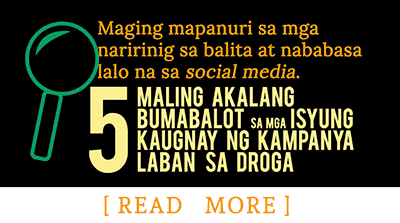Media Coverage
Green Convergence, along with Alyansa Tigil Mina (ATM), held its April 2025 Kamayan Para Sa Kalikasan forum with the theme “Vote Green, Not Greed” on April 25, via Zoom and Facebook livestream, focusing on the electoral campaign agenda for the upcoming 2025 Midterm Elections produced by a broad coalition of organizations—the “Green Agenda 2025.”
Green Convergence Vice President and Miriam College Environmental Studies Institute Executive Director Sr. Marvie Misolas started the forum with her opening remarks, commemorating the life of Pope Francis and his legacy as a “prophet of the poor” and linking it to the moral obligation of voting for leaders who will uphold environmental protection.
Metro Manila, Philippines – Environmental groups have released their lists of what they called “green” senatorial candidates to guide voters supporting those advocating climate justice and ecological protection.
To celebrate Earth Day on Tuesday, April 22, the Luntiang Bayan coalition analyzed the 64 senatorial bets for the midterm polls against its eight-point environmental agenda.
MANILA (LiCAS News): The Philippine Misereor Partnership, Inc. [PMPI] launched its electoral education campaign, “Power of Purple” [PoP] on March 29, calling on Filipino voters to support senatorial candidates committed to sustainable development and social justice.
The PoP campaign will evaluate and inform voters about the positions and policies of 26 senatorial candidates across four critical areas: Climate Crisis and Disasters, Environmental Protection, Livelihoods and Vulnerable Sectors, and Agriculture and Fisheries.
BINIGYANG-LALIM sa Kamustahan ng Malalayang Lasalyano (KAMALAYAN) ang usapin ukol sa pagbabago ng klima at kahalagahan ng pagdeklara ng climate emergency sa Pilipinas sa pangunguna ng De La Salle University Committee on National Issues and Concerns at Sustainability Hub-Manila sa Teresa Yuchengco Auditorium, Enero 15.
Nagbigay-aral sina Lou Arsenio, ecology coordinator ng Roman Catholic Archdiocese of Manila; Yolanda Esguerra, kinatawan ng Philippine Misereor Partnership Inc. (PMPI) at Arnold Belver, deputy chief ng Policy Research and Development Division ng Climate Change Commission (CCC) tungkol sa temang “Hamon sa Climate Emergency”.
Quezon City, Philippines – Environmental advocates, civil society organizations, and policy experts have united to launch the Green Agenda 2025, a comprehensive advocacy platform promoting ecological integrity, climate justice, and sustainable governance for the upcoming elections.
Held at Max’s Restaurant in Quezon City, the press launch introduced the 11-Point Green Agenda, which outlines urgent policy priorities that need to be addressed by candidates in the 2025 elections. The initiative seeks to challenge political aspirants to commit to pro-environment policies and empower voters to make informed choices that will safeguard the country’s natural resources and future generations.
PHILIPPINES – Caritas Philippines president Bishop Jose Colin Bagaforo has called on Filipinos to treat environmental protection as a moral obligation ahead of the 2025 elections.
The prelate warned that political inaction on ecological issues threatens both the survival of communities and the dignity of creation.
He made the call during the launch of Green Agenda 2025, a national advocacy platform aimed at promoting pro-environment governance.
Caritas Philippines president Bishop Jose Colin Bagaforo has called on Filipinos to treat environmental protection as a moral obligation ahead of the 2025 elections.
The prelate warned that political inaction on ecological issues threatens both the survival of communities and the dignity of creation.
He made the call during the launch of Green Agenda 2025, a national advocacy platform aimed at promoting pro-environment governance.
ENVIRONMENTAL advocates, civil society organizations, and policy experts have united to launch the Green Agenda 2025 — a comprehensive advocacy platform promoting ecological integrity, climate justice, and sustainable governance for the upcoming elections.
Held at Max’s Restaurant in Quezon City, the press launch introduced the 11-Point Green Agenda, which outlines urgent policy priorities that need to be addressed by candidates in the 2025 elections.
The Philippine-Misereor Partnership Inc. (PMPI) welcomes with cautious optimism the approval of the mining moratorium in Palawan, a significant step towards the protection of one of the country’s last ecological frontiers. This decision is a testament to the tireless efforts of environmental defenders, civil society organizations, and indigenous communities who have long fought against the irreversible destruction brought about by large-scale mining.
We commend the local government for upholding its responsibility to safeguard Palawan’s rich biodiversity, ancestral lands, and vital ecosystems, which sustain not only its residents but also the entire nation.
Quezon City, Philippines – Philippine Misereor Partnership Inc. (PMPI) welcomes the recent arrest of former President Rodrigo Duterte, which comes in response to mounting calls for justice over the thousands of lives lost during his administration’s so-called war on drugs. This arrest represents a crucial step toward accountability for grave human rights violations and a long-overdue reckoning for the victims and their families.
For years, communities, human rights defenders, and civil society organizations have documented extrajudicial killings, enforced disappearances, and widespread fear instilled by state forces under Duterte’s violent campaign. The death toll, largely composed of the poor and marginalized, reflects a state policy of impunity that disregarded due process, legal protections, and the fundamental right to life. These atrocities were not random incidents but systematic violations that must be addressed through legal and judicial processes, both domestic and international.
The Supreme Court (SC), with its rigid adherence to the Rules of Court and legal technicalities, has just made the difficult struggle of the country’s subsistence fisherfolk even harder.
On Dec. 20, 2024, the Supreme Court’s First Division upheld the Malabon Regional Trial Court’s 2023 decision declaring Sections 4 (58), 16, and 18 of the Philippine Fisheries Code or Republic Act No. 8550, as amended by RA 10654, unconstitutional.
We, the 230 members of the Philippine-Misereor Partnership Inc. (PMPI), express profound concern regarding the Supreme Court’s First Division’s affirmation of the Malabon Regional Trial Court’s decision declaring Sections 4 (58), 16, and 18 of the Philippine Fisheries Code (Republic Act No. 8550, as amended by RA 10654) unconstitutional. This decision would allow large-scale commercial fishers to operate within municipal waters, further threatening the livelihoods of small-scale fishers who depend on these waters for their daily sustenance.
